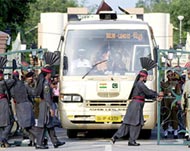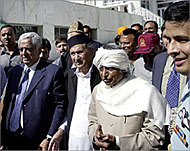Bus service to bridge divided Kashmir
India and Pakistan have announced a bus service from 7 April between Srinagar and Muzaffarabad, the two principal towns of divided Kashmir.

The announcement has been received well by the people in Indian-administered-Kashmir and but got mixed reactions from politicians.
India’s Foreign Minister Natwar Singh and his Pakistani counterpart Khurshid Mahmood Kasuri said in Islamabad on Wednesday that they were working on a slew of confidence-building measures, as the peace process between the two South Asian neighbours seems to be gathering momentum once again.
Some of the objections to the Srinagar-Muzaffarabad bus service, like Pakistan‘s insistence on local documentation and India‘s concerns about security, seem to have been resolved.
“Considering the overall improvement on the atmospherics, we’ve taken positive steps that augur well for the future of our relations with each other,” said Kasuri.
Imperative
Singh who is on a visit to Pakistan said peace between the two countries was not just a desirable objective, but imperative.
 |
|
The bus service could have a |
Many people in Indian-administered Kashmir believe the start of the bus service could have a positive effect on talks on the otherwise vexed issue of Kashmir lingering since 1947 when India and Pakistan gained their independence from Britain only to be engaged in series of wars over Kashmir.
Both sides claim the predominantly Muslim state in full.
Chief minister of Indian-administered Kashmir, Mufti Muhammad Sayid, said of the bus pact: “It is a great stride and the biggest confidence-building measure since 1947,” he told a press conference in the winter capital Jammu, on Wednesday.
“This would have a healing effect for a people bruised by long turmoil and uncertainty in Kashmir,” he said. He complimented the leaders of India and Pakistan for “showing great statesmanship in not allowing technicalities to come in the way of the bus service”.
Kashmir’s chief Muslim cleric and leader of the separatist Hurriyat Conference Mirwaiz Umar Farooq said it was a positive development in India-Pakistan relations and the first serious step towards resolving the Kashmir issue amicably.
 |
|
Sayid (L) said the bus service |
“We had been, from day one, saying that the bus service should not be made hostage to any visa-passport restrictions,” he said, adding that Kashmiris should be allowed to board the bus without any discrimination.
Umar Farooq asserted that the bus was not the end in itself but a beginning. “The other traditional routes that stand closed for nearly six decades should also be reopened and trade and commerce allowed between the two sides as that will enhance the people-to-people dialogue,” he said.
Mixed reactions
The news from Islamabad brought smiles and jubilation for many divided families spread across the two parts of Kashmir eager to reunite.
Prominent separatist leader and chief of the People’s Democratic Freedom Party, Sayid Shabir Ahmad Shah, agreed the bus pact was a major step towards confidence building between the two countries.
“But it would have no bearing on the dispute over the state,” he said.
Sayida Aasiya Indrabi, chief of the radical women’s group Dukhtaran-e-Millat (daughters of the Faith), said: “It would dilute the Kashmir issue and those who support the move would be seen only as co-conspirators.”
 |
|
Umar Farooq called for the |
Sayid Ali Shah Jilani, the leader of a faction of Hurriyat Conference, said it was a non-issue for the majority of Kashmiris.
Jilani and another key leader of the Kashmiri separatist campaign Muhammad Yasin Malik had at a meeting held in New Delhi with visiting Pakistani Prime Minister Shaukat Aziz last year opposed the bus service.
Their argument was that it would ultimately transform the Line of Control – the de facto border that splits disputed Kashmir between Indian and Pakistani administered parts – into a permanent border.
“Hence the core issue of Kashmir would be eclipsed,” Yasin had said.
A Jilani lieutenant added on Wednesday: “It will be detrimental to our freedom struggle.”
Other agreements
The Indian and Pakistani foreign ministers also announced other agreements, including a bus service between Amritsar and Lahore, movement of pilgrims to shrines in Pakistan and a rail service between Khokrapar and Munabao.
India has also agreed to a gas pipeline from Iran to pass through Pakistan, subject to New Delhi’s security concerns being addressed.
The pipeline would be a major gain for Pakistan as it would earn $700 million a year in transit fees from India.